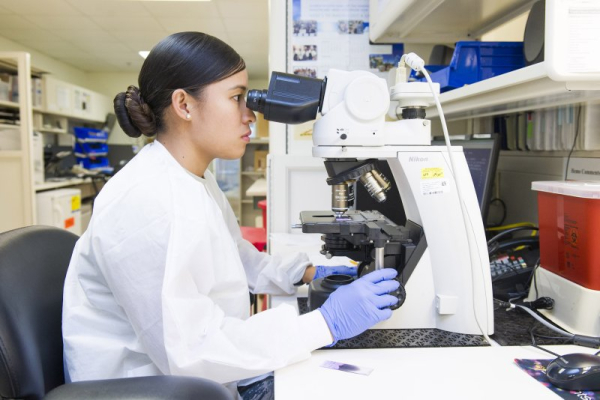New award given to help early career researchers in dystonia


A medical laboratory technician performs a microscopic examination of a blood smear in 2017. A new award will help early career researchers who study dystonia, the Michael J. Fox Foundation announced Tuesday. File Photo by Phil Sunkel/U.S. Air Force
A new award will help early career researchers who study dystonia, the Michael J. Fox Foundation announced Tuesday.
The new Bachmann-Strauss Early Career Award is a two-year, $150,000 award supporting early-career clinician researchers focused on advancing understanding and treatment of dystonia.
Dystonia is a common movement disorder, affecting an estimated 500,000 people in North America. More than 30% of people living with Parkinson’s may experience dystonia as a symptom or treatment complication.
The condition can be mild to severe, affects different body parts and can cause dragging leg, cramping of the foot, uncontrollable blinking and speech difficulties.
The new program is designed to empower the next generation of clinician researchers dedicated to uncovering the causes of dystonia and advancing new treatment approaches.
The first winner of the award is Dr. Adina Wise, a fellowship-trained movement disorder specialist and neurologist at the Icahn School of Medicine at Mount Sinai in New York, N.Y., who will collaborate with colleagues at Massachusetts General Hospital and Harvard Medical School.
Wise’s project is guided by mentors Dr. Susan Bressman and Dr. Rachel Saunders-Pullman, both leading experts in movement disorders at Mount Sinai.
“I am deeply honored to receive the inaugural Bachmann-Strauss Early Career Award for Dystonia Research,” Wise said in a statement. “This support will enable our team to investigate the neural circuits and genetic factors that drive dystonia, with the goal of identifying new biomarkers and therapeutic targets that can guide earlier diagnosis, refine treatment strategies, and ultimately improve outcomes for people living with dystonia and Parkinson’s disease.”
The award is a collaboration between the MJFF and its board member Bonnie Strauss and her husband, Tom Strauss, co-founders of the Bachmann-Strauss Dystonia and Parkinson Foundation.
In 2017, researchers in England discovered a gene mutation that causes dystonia. In 2018, researchers found that those with dystonia can develop immunity to botulinum toxin injections, which are used to help control the disorder.

